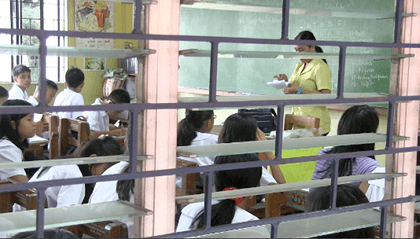SUMMARY
This is AI generated summarization, which may have errors. For context, always refer to the full article.

MANILA, Philippines – A majority of students, parents and teachers support the new K-to-12 education system as they believe it will help graduates to be better prepared for college or joining the workforce.
The Philippines is the last country in Asia to adopt a 12-year basic education cycle. Under the new system, Grade 7 is the first year of junior high school, after which senior high school will include Grades 11 and 12 for a total of two years additional schooling.
Rappler interviewed students, parents and teachers from Ramon Magsaysay High School (RMHS) in Cubao, a public institution that will implement the new program this year, as well as from Ateneo High School in Katipunan, a private school that will introduce the K-to-12 system starting next year.
“I think it is going to be very good because we will learn more about many subjects in our school and learn more about our education in life,” said 12-year-old Ted Tayactac, a seventh grader (first year high school) student at RMHS.
Tayactac would like to study to become a scientist, but he feels he was not learning enough under the old system to satisfy his thirst for knowledge about science. “I feel I need to learn more about planet Earth and other stuff. Maybe I don’t know exactly what more we need to learn, but this is just not enough.”
Impractical?
Ryan Orias, another first year high school student at Ateneo, disagreed with Tayactac and complained that the new 12-year cycle is “impractical” as “it does not really matter if we add two more years.”
“Our parents are going to need more income for the additional years and it is going to take more time for us to finish our studies. If we go to college, it is another two, so seven more years from now, because we cannot go straight to work.”
The 13-year-old explained that “the problem is not in the schools, it’s in the students. Students are not that into studying, so if we get them to focus more, maybe we could have a better Philippines in the future.”
“I think students will be better prepared, but i don’t think this is needed because we need to be practical in life.”
Sacrifice for better education
The implementation of K-to-12 directly affects parents, who from now on must pay two additional years in tuition for their kids to graduate.
Nevertheless, most seem to think it is worth it if their children get a better education and are willing to make the sacrifice for them, like Anna Laus-David, whose son Adrian starts high school at Ateneo.
“Right now, my son is in his first year, so he is quite young. I don’t mind an additional year or two before he gets into college,” she said. “Kids now are quite young and immature, I want to make sure he has been prepared very well and he has the skills to be out there for work.”
David said her son “really likes going to school, so I don’t think he minds” and said she has been preparing him for the extra years even if Ateneo will not start to implement K-to-12 this academic year.
And she accepts the extra economic burden: “Even if it is gonna cost more for us, it is going to be better for our soon, so we must make the sacrifice.”
“The additional fees are not so good,” said Divina Ga, whose daughter Selma, 11, attends RMHS in Cubao. Ga supports the new system because “it has some advantages in preparation for college” although she admitted young Selma thinks it is too long.
“It is better because some of the students now really don’t know much about what they have studied.”
Preparing to adjust
Elena Casiño, a 7th Grade English teacher at RMHS, believes K-to-12 will benefit her pupils due to the “new skills they can use in the future” that will be included in the new curriculum.
“Initially, I thought that the two extra years would be a huge burden at the families, but after attending the seminars, now I think it is worth it, because what they will learn will help them when they are looking for a job after high school.”
Casino also explained that “as teachers, we really have to be flexible with these changes in the curriculum” and feels that the pupils “are going to be flexible and adjust.”
Maria Jennifer A. Concepcion, associate principal for academic affairs at AHS, has mixed feelings about the new system.
“An enhancement in the curriculum is always a good addition for education. However, we still need to look into how we will be implementing it. In our system right now the students are given quite a lot of curriculum, but the additional two years will be benefitial for them in terms of more things to learn and topics they can cover.”
Concepcion said that she and her staff are currently reviewing the materials provided by the Department of Education, looking at the appropriate topics to add for the incoming Grade 7 students now and in the future for Grades 11 and 12.
“Some may be apprehensive because of the changes that will happen, but many more are open about it, and we are eager to consider what we may add with this enhanced curriculum.” – Rappler.com
Click the links below for related stories.
Add a comment
How does this make you feel?
There are no comments yet. Add your comment to start the conversation.